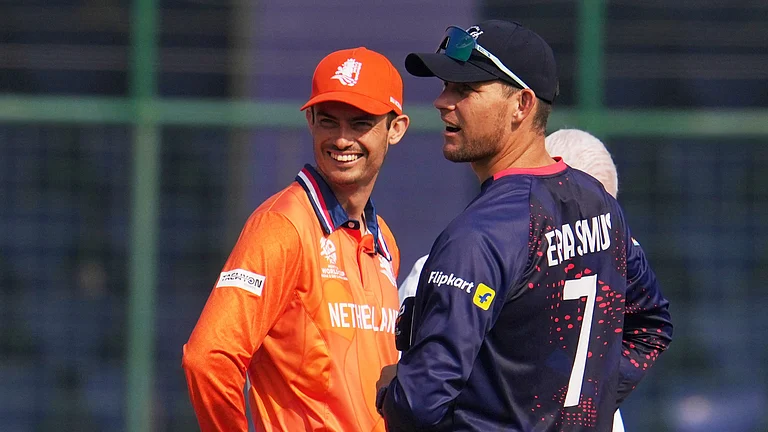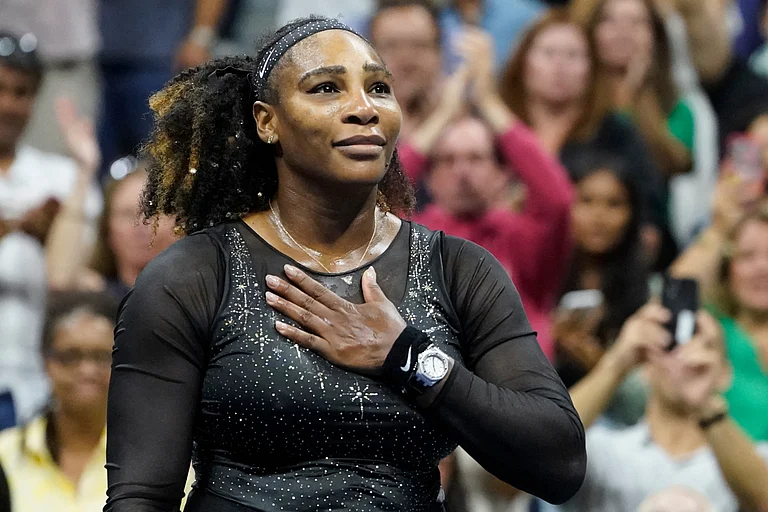- The opening ceremony will begin at 8 pm on August 8, 2008—eight is considered auspicious. The closing will be on August 24, at 8 pm.
- China has spent $40 billion to give Beijing a new sheen. The message: we are a superpower.
- Some 5 lakh foreign visitors expected in Beijing. The Games will be seen on TV by 4 billion.
- More than 80 heads of state, 10,000 athletes and 25,000 journalists expected in Beijing
- Apart from security to prevent disruption, meteorologists will stand by to chase clouds and prevent disruption by rain
- An estimated 1.5 million people were evicted to construct the 31 venues for the Games. Those who worked at these sites have been asked to move out of the city. Other migrants from the countryside also sent home.
- City’s old quarters, with their tumbledown charm, demolished. Replaced by designer versions of traditional architecture.
***

Frontispiece: A Beijing resident does up his house
The Games would be as much a celebration of the high points of China’s an- cient civilisation as an endorsement of the Communist Party’s 30 years of reforms that have brought the world to China’s door. More than 80 heads of state, 10,000 athletes and about 25,000 members of the media would converge in Beijing for what former International Olympic Committee (IOC) president Juan Antonio Samaranch predicted would be "the best Games in Olympic history."
The message being drummed across here by the Communist Party is: modern China is getting the recognition and attention of the outside world in a measure unseen since foreign dignitaries paid their respects to the imperial court of the Son of Heaven, an exalted title created in ancient times. "Chinese rulers are seeking to prove to their subjects that this is the dawn of a new golden age for China," says Liu Junning, an analyst with the Chinese Cultural Studies Institute, Beijing. "To the outside world they want to say: pay attention, because a new superpower has arrived."

A student gets her face painted for the Olympic Games
A breakneck $40-billion makeover of the Chinese capital is underpinned by a desire to project the image of a rising and confident China, which has shed centuries of political isolation and internal turmoil to resume its rightful role on the world stage. The brand new National Stadium, where the opening ceremony will be held, is a fitting symbol for China’s Olympics theme of rebirth. Its dense latticework body of interwoven steel is reminiscent of a bird’s nest where the phoenix of China’s national pride would be reborn.
The opening ceremony will begin at 8 pm on August 8, 2008—a perfect configuration of the lucky number 8. The Chinese believe the number 8 to be auspicious because its pronunciation sounds like the character ‘fa’, which means prosperity. Not even the weather would be allowed to interfere with the parade of athletes and lighting of the Olympics flame. Chinese meteorologists would stand by, ready to chase pregnant clouds away by pounding them with rockets containing silver iodide before heavy rain spoils the jamboree. Even for a nation renowned for its attention to detail and fondness for symbols, the sheer crafting that has gone into perfecting the setting and the timing of the Olympic Games is really astounding. "Everything is permeated with the idea that this rare combination of cosmic luck and national honour has been delivered to the people by their leaders," says Liu.
Which is why the thought of any disruption resonates painfully with the Beijing Olympics organisers. All the more because the Chinese leadership is aware that the world doesn’t endorse its vision of grandeur and harmony unreservedly. This fear of disruption began to creep in after celebrated film director Steven Spielberg, citing China’s support for the Sudanese government amid the humanitarian crisis in Darfur, resigned as an artistic advisor for the Olympics opening and closing ceremonies. Since then, Beijing has been haunted by fears that human rights groups might hijack its global showcase of resurgence to push their own agendas by humiliating China.
Chinese leaders got a foretaste of it when China’s long-planned international Olympic torch relay was swamped in a global wave of protests. In city after city worldwide, protesters came out to oppose Beijing’s rule in Tibet, its human rights record at home, the suppression of press freedom and persecution of members of the banned spiritual movement, Falun Gong.

Dissent silenced: Elderly citizens take on police during a stir against a powerhouse
China fought back against such criticism, launching a charm offensive abroad and clamping down on dissenters at home. All individuals and groups that might provide outsiders with evidence of flaws in Chinese society have been gradually silenced. High-profile critics of the governments, such as aids campaigner Hu Jia, have long been locked up, while others have been placed under surveillance. In early July, three human rights lawyers were put under house arrest to prevent them from meeting visiting US legislators who were seeking the release of China’s more than 700 political prisoners.
China’s moment of glory is expected to draw an estimated 5,00,000 foreign visitors and 4 billion TV viewers worldwide. Games organisers hope that visitors to Beijing would see the exaltations of the crowds and the dazzling architecture but miss the undercurrent of social strain. They hope to conceal the existence of underpaid migrant workers who have toiled to revamp Beijing for the Olympics but are now told to leave their squalid on-site dorms and stay out of the city at least until the Olympic party is over.
A display of life of prosperity and harmony in Beijing would be virtually cocooned from the social strife in the rest of the country, where entrenched corruption, land-grabs and growing income disparity have led to several violent riots in recent weeks. Petitioners coming to Beijing to seek redress for injustices they say they have suffered at the hands of local officials have been rounded up and expelled from their temporary shelters. Last week, a 54-year-old woman, a petitioner from Nanchang, jumped to her death from a bridge near Beijing Railway Station after she was allegedly forced to return to her hometown.
"We feel like there is not a single outlet left for us to speak about right and wrong," says peasant woman Hua Guoling, who hails from the southern province of Guangxi. She is in Beijing to petition about the loss of her plot of land to redevelopment plans by local officials. Hua had been sharing an accommodation with several other petitioners who were hoping to get a hearing from the central government on their grievances. "Because of police raids we have had to move every night. It is impossible to stay in Beijing any longer. We have to go home," she says.
The ambition to present a China reborn has also seen the host city reinvent itself culturally. Since Beijing was granted the Games by the IOC in 2001, the ancient heritage of the Chinese capital has fallen prey to the wrecking ball of developers. Chalk-written signs of ‘chai’, or demolish, went up all over the city as people were displaced to make way for the 31 Olympic venues. In the new Beijing, the state set out to protect only those sites that served to bolster its own self-validating version of history. The unaffected charm of the jumble of old houses and cobwebbed doors has all been swept away and replaced with scores of newly established museums where life is exhibited under glass covers.
Beijing’s cultural heritage is now confined to several "misnamed cultural protection zones", says Australian historian Geremie Barme. "These present an idealised vision of old Beijing’s hutongs (narrow alleys) and courtyard houses built purposefully for real estate agents and tourists." Italian architect Carlo Santoro, co-author of Beijing, The New City, says the Olympics makeover (on which Beijing spent three times more than Athens) illustrates China’s fascination with image. "When we talk about preservation, we in the West believe in preserving the identity. In China, they talk about preserving the image."

Noteworthy: New currency for the Games
The Swiss-based Centre for Housing Rights and Evictions estimates that 1.5 million people have been evicted from their homes because of the Olympics. "The authorities have used tactics of harassment, repression, imprisonment and even violence against residents and activists," the organisation said this month.
One of the last ‘nail houses’ (a Chinese term for homes of those who refuse to make room for development) of old Beijing disappeared with the demolition of the Yu family’s home last week. The family, which had lived on Dianmen Avenue near some of the interconnected lakes of the old city for 60 years, had put up a spirited resistance, saying they would defend their house with their lives and wouldn’t leave because the compensation offered was too little. "We really support the Olympics but we oppose any official depriving us of our property in the name of the Games," Yu Pingju, a shopkeeper, said a day before bulldozers razed her house.
Yet there are those too who eagerly defend China’s right to host the Olympics and believe the pain it has inflicted on thousands of people is all worth it. "If you think of it, the Olympics would have never been awarded to a China of 30 years ago," says Zhang Gaoliang, a sales person in a foreign company in Beijing. "Republican China was weak. Imperial China was big but bullied by foreign powers. People abroad may say whatever they want about the Communist Party but we wouldn’t have done it without their guidance. The respect we are awarded by the outside world now has a lot to do with our expanding economic power."
This line of thought is shared by many young urban Chinese—beneficiaries of the country’s stunning economic transformation. The notion runs deeper than a learned and rehearsed propaganda utterance. For along with winning the right to host the Olympics, the Communist Party has scored another victory too—by force-feeding generations of Chinese on a diet of nationalist rant, it has managed to strengthen their allegiance to the regime. Display of loyalty by China’s youth during the Games would be arguably the Beijing Olympics’ most memorable pageantry.


























